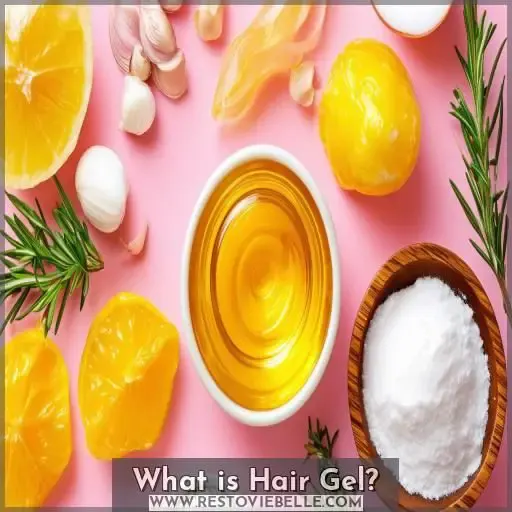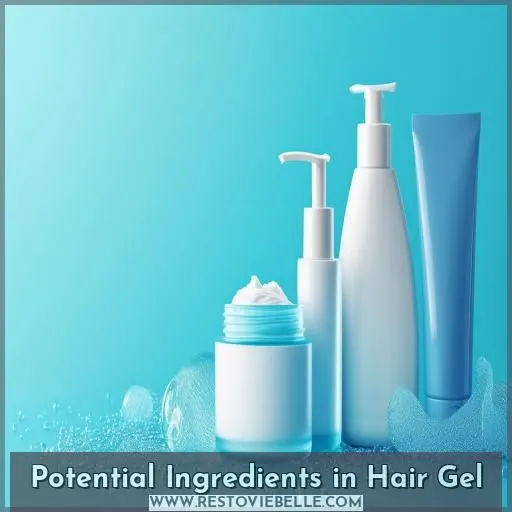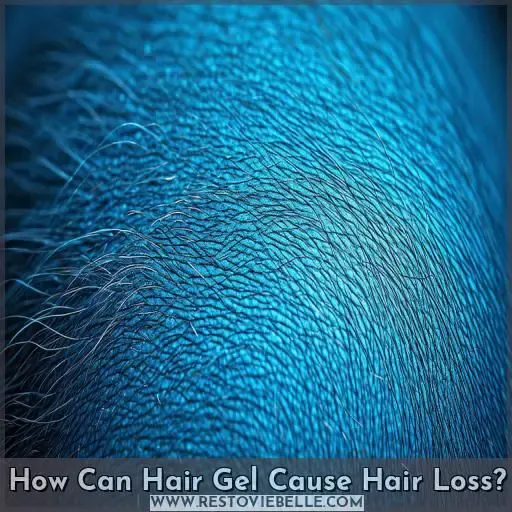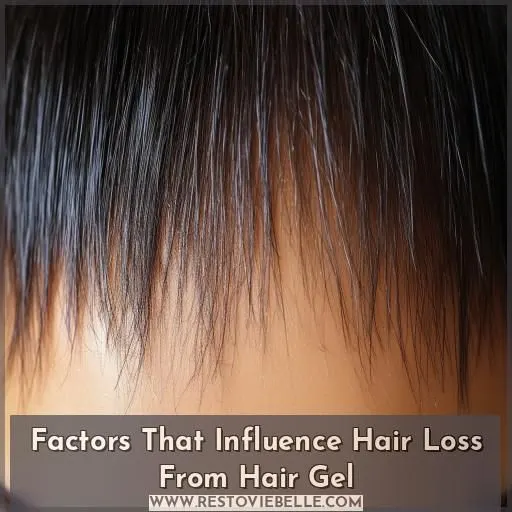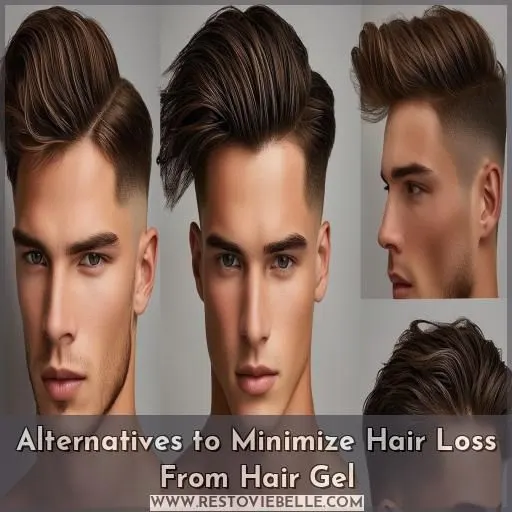This site is supported by our readers. We may earn a commission, at no cost to you, if you purchase through links.
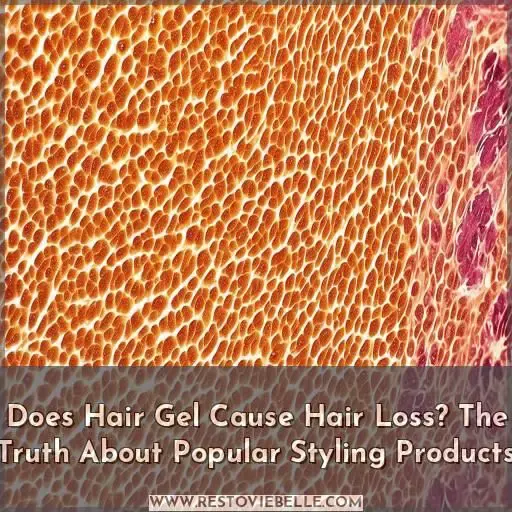 You’re right to be concerned – hair gel can unfortunately lead to hair loss for some people.
You’re right to be concerned – hair gel can unfortunately lead to hair loss for some people.
Many gels contain harsh chemicals like sulfates, parabens, and silicones that strip your hair’s natural oils. This weakens strands, causing breakage, and can also clog follicles, inhibiting new growth.
How frequently you use gel, your hair type, and sensitivity to ingredients all play a role. But don’t worry, you’ll learn tips to minimize damage while still rocking a stylish ‘do.
Table Of Contents
Key Takeaways
- It’s a hair-raising truth: Some hair gels can leave your locks feeling like a dry, brittle tumbleweed due to harsh sulfates, parabens, and silicones stripping away your mane’s natural oils. Talk about a bad hair day!
- Don’t let those pesky chemicals clog your precious follicles and stunt new growth. You deserve a scalp that can breathe and hair that can flourish without being stifled by product buildup.
- When it comes to gels, moderation is key. Overloading your locks can weigh them down and cause excessive buildup, potentially leading to thinning over time. A little dab will do you, as they say.
- Your hair type and condition play a pivotal role in how gels affect your tresses. Thick, coarse hair may require more product, while fine, delicate strands could get weighed down easily. Treat your locks like the precious gems they are and choose wisely.
Does Hair Gel Cause Hair Loss?
Yes, hair gel can potentially cause hair loss. Certain harsh ingredients in some hair gels like sulfates, parabens, and silicones can strip the hair of natural oils, cause breakage, and clog hair follicles which inhibits growth.
What is Hair Gel?
Hair gel is a styling product designed to keep hair in place and create a specific look or hairstyle. It typically contains ingredients like polymers, resins, and holding agents that form a flexible yet durable cast around hair strands to maintain their shape and hold.
Composition of Hair Gel
Hair gel is a styling product made from polymers dissolved in water or alcohol.
Gel formulations typically contain synthetic ingredients like polyvinylpyrrolidone and carbomers.
While gels provide hold and control, harsh ingredients can strip hair’s natural oils, leading to breakage and potential hair loss over time.
Exploring natural alternatives that prioritize hair health and scalp care through product research is recommended.
Purpose and Benefits of Using Hair Gel
You use hair gel to achieve a specific hairstyle or look. It provides styling options by offering different hold strengths, shine enhancement, and frizz control. Despite these benefits, some gels contain harsh ingredients that can lead to scalp irritation and potential hair loss over time.
Potential Ingredients in Hair Gel
Many popular hair gels contain harsh chemicals like sulfates, parabens, and silicones that can strip away your hair’s natural oils and cause dryness, breakage, and even hair loss over time. While these ingredients help create the desired hold and texture, prolonged exposure can damage your scalp’s health and clog hair follicles, inhibiting new growth.
Harsh Chemicals Like Sulfates, Parabens, and Silicones
You may notice ingredients like sulfates, parabens, and silicones on hair gel labels. These harsh chemicals can:
- Strip your hair of its natural oils
- Cause dryness, brittleness, and breakage
- Clog follicles, inhibiting growth
- Disrupt your scalp’s pH balance
Prioritizing chemical alternatives, product safety, labeling regulations, user education, and industry accountability can protect your hair’s health.
Effects of These Chemicals on Hair and Scalp
Those harsh chemicals can wreak havoc on your locks and scalp. You might experience allergic reactions, scalp irritation, dandruff exacerbation, hair thinning, or dryness. Check out this table to see how each culprit affects your precious mane:
| Chemical | Hair Effects | Scalp Effects |
|---|---|---|
| Sulfates | Dryness, Breakage | Irritation, Dandruff |
| Parabens | Hair Thinning | Allergic Reactions |
| Silicones | Buildup, Dullness | Clogged Follicles |
How Can Hair Gel Cause Hair Loss?
You might experience hair loss from using hair gel because the harsh chemicals like sulfates, parabens, and silicones can strip your hair of its natural oils, causing breakage and damage. Additionally, these ingredients may clog your hair follicles, inhibiting new growth and contributing to thinning hair over time.
Stripping Natural Oils From Hair
Many hair gels contain harsh ingredients that strip away your hair’s natural oils, leading to drying and scalp irritation. As your scalp becomes dehydrated, dandruff may form, further damaging hair follicles. Over time, this drying effect can contribute to thinning hair and impede new growth.
Causing Hair Breakage and Damage
When hair gel strips your hair’s natural oils, it also weakens your strands. This leaves you vulnerable to:
- Split ends and breakage
- Dry, brittle texture
- Scalp irritation from product buildup
Damaged, thinning hair can be a prime side effect of gel overuse. While manageable with care, persistently harsh gel can exacerbate overall follicle weakness and accelerate hair loss.
Clogging Hair Follicles and Inhibiting Growth
Additionally, the harsh chemicals in some hair gels can block your hair follicles, hindering proper nutrient absorption and exacerbating follicle inflammation. This often leads to scalp irritation, dandruff exacerbation, and even allergic reactions – disrupting your hair’s growth cycle and causing excessive shedding. To prevent this, opt for gentle, breathable styling products that won’t suffocate your scalp.
Factors That Influence Hair Loss From Hair Gel
The degree to which hair gel may contribute to hair loss depends greatly on how frequently you use it and the amount applied. Your individual hair type, condition, and sensitivity to the ingredients found in hair gels also play a critical role in determining the potential for hair loss or damage.
Frequency of Use
If you use hair gel frequently, the long-term effects on your hair and scalp can be detrimental.
The constant application of harsh ingredients can strip your hair’s natural oils, leading to dryness, brittleness, and breakage.
Additionally, prolonged use may cause scalp irritation, especially if you have a sensitive scalp or coarse hair texture.
To minimize damage, consider alternative application methods and incorporate home remedies into your routine.
Amount Used
You’re probably thinking, "How much gel am I using?" Overloading your locks with too much product can:
- Weigh hair down
- Clog follicles
- Cause excessive buildup
A little goes a long way! Frequency of use and hair damage are also key factors, but moderation with gel is wise. Coating every strand isn’t necessary for a polished look.
Hair Type and Condition
Your hair type and condition materially impact how gel affects it. Fine, thin hair is prone to gel accumulation, weighing it down. Coarse, thick hair may require more product, risking scalp irritation. Porous, damaged hair absorbs gel, leading to brittleness.
| Hair Type | Potential Issue |
|---|---|
| Fine | Weighs hair down |
| Thick | Scalp irritation |
| Damaged | Hair brittleness |
| Dry | Increases dryness |
Being mindful of your hair’s needs ensures gels don’t worsen existing problems.
Sensitivity to Ingredients
Your sensitivity to ingredients is also a factor. If you’re prone to allergic reactions, skin irritation, scalp inflammation, or dandruff, harsh hair gel ingredients could exacerbate these issues. Product buildup on your scalp from gel residue may also trigger reactions. Pay close attention to how your scalp responds to different formulas.
Alternatives to Minimize Hair Loss From Hair Gel
To minimize potential hair loss from using hair gel, you should choose a product with gentle, natural ingredients that avoid harsh chemicals like sulfates, parabens, and silicones. Additionally, thoroughly washing your hair after use and giving it a break from gel occasionally can help prevent buildup, damage, and follicle obstruction that may contribute to hair loss.
Choosing a Gel With Natural, Gentle Ingredients
You can minimize hair loss by choosing a gel formulated with natural, gentle ingredients that nourish your hair and scalp. Look for eco-friendly options containing plant oils, aloe vera, and proteins instead of harsh sulfates or silicones. Compare product labels and read reviews to find a nourishing, scalp-healthy gel that styles without damage.
Washing Hair Thoroughly After Use
After using hair gel, you’ll want to thoroughly rinse your hair to remove any residue. Here’s how:
- Use lukewarm water to open up hair cuticles
- Gently massage your scalp in circular motions
- Rinse until the water runs completely clear
- Follow with a clarifying shampoo if needed
- Condition to replenish moisture and shine
Proper rinsing prevents buildup that can clog follicles and stunt hair growth.
Giving Hair a Break From Gel Occasionally
In addition to thorough cleansing, consider giving your hair a temporal cycle break from gel products. Implementing a product rotation strategy can minimize scalp irritation and maximize hair health for excellent results. This periodic respite allows your strands to recover and revitalize, promoting stronger, more resilient growth over time.
Maintaining a Healthy Scalp and Hair Routine
You’ll want to maintain a healthy scalp and hair routine alongside using hair gel. Here are some tips: 1) Massage your scalp regularly to promote blood flow, 2) Use a gentle, sulfate-free shampoo, 3) Deep condition weekly to replenish moisture, and 4) Trim split ends frequently to prevent breakage.
Frequently Asked Questions (FAQs)
How long does hair gel effect last?
Truthfully, hair gel’s effects are temporary – those flexible, moldable styles usually last until your next shampoo. The key is using high-quality products and avoiding over-styling that can stress strands. With proper application and moderation, you can achieve trendy looks without compromising hair health.
Can hair gel cause dandruff or scalp irritation?
Yes, hair gels can potentially cause dandruff or scalp irritation for some people. The ingredients in gels can clog pores and dry out the scalp, triggering flaking and itchiness. It’s wise to check labels and choose gentle, non-comedogenic formulas if you’re prone to scalp issues.
Is hair gel safe for color-treated hair?
Yes, hair gel is generally safe for color-treated hair. However, alcohol-based gels can dry out colored strands, so opt for water-based formulas to keep your vibrant hues intact.
Does hair gel work well with certain hairstyles?
8 out of 10 stylists recommend gel for slick looks. It works exceptionally with spiky, messy, or sculpted hairstyles by adding hold and definition. The key is using a pea-sized amount and distributing evenly through damp hair.
Are there any age restrictions for using hair gel?
There’s no specific age restriction for using hair gel. However, it’s advisable for younger kids to avoid products with harsh chemicals that could irritate their scalp or affect hair health. Stick to gentle, kid-friendly formulas if needed.
Conclusion
Ultimately, whether hair gel causes hair loss depends on your hair type, frequency of use, and the specific ingredients.
To minimize risks, carefully read labels.
Opt for gentler formulas without harsh chemicals.
Alternate gel days with break periods.

